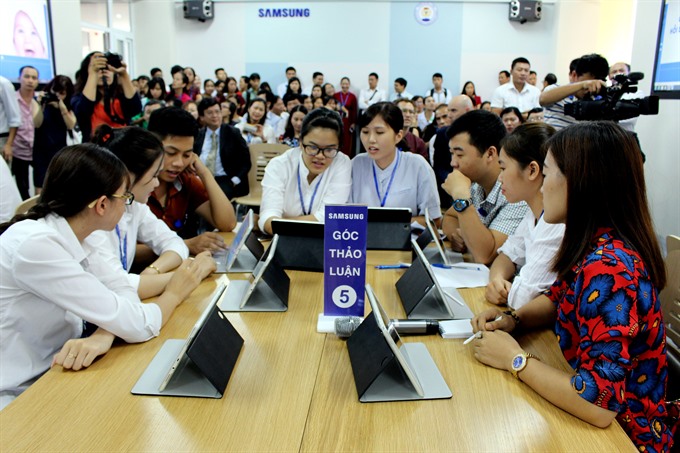 Politics & Law
Politics & Law

University autonomy is a global trend and Việt Nam can’t ignore it, National Assembly deputies agreed yesterday.
 |
| Students at the smart school at Thái Nguyên University of Medicine and Pharmacy. It is expected to improve students’ critical thinking and enhance their interaction with lecturers. NA deputies highlighted university autonomy as key for Việt Nam’s higher education moving forward. — VNA/VNS Photo Thu Hằng |
HÀ NỘI – University autonomy is a global trend and Việt Nam can’t ignore it, National Assembly deputies agreed yesterday.
During a session where they discussed the draft amended Law on Higher Education, Deputy Hồ Thanh Bình from An Giang Province praised the draft amended Law on Higher Education for thoroughly addressing the policy on university autonomy, including regulations on academic autonomy, finances and personnel.
The amendment also regulates mechanisms to ensure university autonomy by clarifying the role of university councils and defining relations between councils and rectors. Universities will enjoy more autonomy, and they must be accountable for their organisation, human resources, finances and assets.
“If the draft law is passed, it will provide opportunities for universities to develop and remove many ‘bottlenecks’ to university autonomy,” Bình said, adding that university autonomy was essential for each institution to enhance competitiveness.
“I think the State should pay as much as possible attention to this policy so that motivation can be created for universities to be autonomous gradually in the long run. While it would be challenging and universities might hesitate initially, they’ll realise this trend would help them improve their real capacity, especially in training and scientific research,” he said.
Deputy Vũ Trọng Kim from Hải Dương Province agreed and said that it was time to let universities make their own decisions.
"In that spirit, the school leadership must renovate the management mechanism. When self-reliance is promoted, individuals and groups of schools will have to mobilise and innovate to train a labour force that can meet the requirements of the economy,” Kim said.
Kim also said one important part of university autonomy was that schools must be financially self-reliant.
“This is a mandatory requirement and must be implemented from the very first phase. It is time the Government stop subsidising schools. It doesn’t mean the State will no longer invest in universities, but for schools to have funding from the State, they will have to compete really hard. Because the State will make ‘orders’ for schools to train a labour force that it can really use,” he said.
If a school’s leadership is well-defined, it will help the school grow and attract more students, he said.
Education quality control
Deputy Lê Thu Hà from Lào Cai Province had some concerns about Article 9 in the draft law, which allows educational institutions to choose national and international ranking systems to take part in.
Hà said ranking higher education institutions is a new issue for Việt Nam.
Over time, some educators have analysed the pervasiveness of some popular global university ranking systems. In addition, while many Vietnamese universities have been accredited by Vietnamese bodies for the past two or three years, the results of such rankings have caused doubts about the objectivity and transparency of some organisations.
She said it was necessary for universities to provide honest and transparent reports to the public.
The release of such data should be monitored strictly, she said.
Deputy Đặng Thị Mỹ Hương from Ninh Thuận Province, meanwhile, suggested relevant bodies study strict regulations with higher education independent accreditation organisations.
“There is also a need to have a clear and detailed mechanism in which the State management body on education quality be responsible for the inspection, examination and control of the quality of education,” Hương said.
The draft law is expected to be adopted at this 6th session.
On the same day, the draft law on amendments and supplements to the Law on People’s Public Security Forces was also discussed.--VNS




